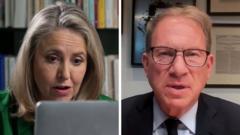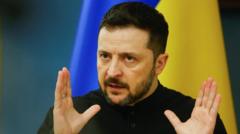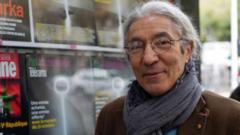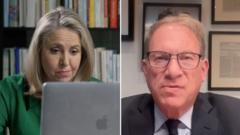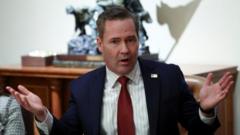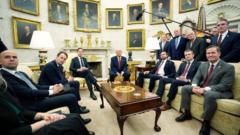French Minister Philippe Baptiste criticized the incident as alarming and highlighted the potential impact on international research dynamics.
French Scientist Denied Entry to U.S. Over Trump Policies, Government Alleges

French Scientist Denied Entry to U.S. Over Trump Policies, Government Alleges
A French academic was barred from entering the U.S. after expressing views on Trump-era policies, raising concerns over academic freedom.
In a worrying development for academic freedom, the French government reported that a scientist was prevented from entering the United States earlier this month due to opinions he shared regarding policies of the Trump administration. Philippe Baptiste, France’s Minister for Higher Education and Research, characterized this incident as troubling, emphasizing the importance of safeguarding freedom of opinion and academic research.
The unnamed scientist, affiliated with France's publicly funded National Center for Scientific Research, was on his way to a conference near Houston when U.S. border officials blocked his entry. Baptiste explained that the intervention arose from exchanges found on the academic's phone, where he expressed his personal opinions about Trump’s science policies.
Details of the incident remain unclear, particularly regarding the specific content that led border officials to deny the scholar entry or the basis for examining his phone. U.S. Customs and Border Protection stated that while customs officers possess the authority to search electronic devices upon entry, such instances are infrequent, with less than 0.01 percent of travelers experiencing this in 2024.
Baptiste’s office withheld additional details on the case, and the National Center for Scientific Research has not yet commented. Meanwhile, an American Embassy spokesman declined to address the matter. Previous reports from Agence France-Presse had already drawn attention to the scientist's barring from entry.
This incident has further fueled Baptiste's criticisms of the current U.S. administration regarding its impact on academic freedom. He noted that funding cuts and layoffs affecting U.S. higher education and research institutions highlight a worrying trend. Baptiste has actively encouraged French universities and research centers to be more welcoming to researchers who might feel threatened in the current U.S. academic environment, asserting, “Europe must be there to protect research and welcome the talent that can contribute to its success.” This situation continues to resonate amid ongoing discussions about the conditions for academic professionals globally.
The unnamed scientist, affiliated with France's publicly funded National Center for Scientific Research, was on his way to a conference near Houston when U.S. border officials blocked his entry. Baptiste explained that the intervention arose from exchanges found on the academic's phone, where he expressed his personal opinions about Trump’s science policies.
Details of the incident remain unclear, particularly regarding the specific content that led border officials to deny the scholar entry or the basis for examining his phone. U.S. Customs and Border Protection stated that while customs officers possess the authority to search electronic devices upon entry, such instances are infrequent, with less than 0.01 percent of travelers experiencing this in 2024.
Baptiste’s office withheld additional details on the case, and the National Center for Scientific Research has not yet commented. Meanwhile, an American Embassy spokesman declined to address the matter. Previous reports from Agence France-Presse had already drawn attention to the scientist's barring from entry.
This incident has further fueled Baptiste's criticisms of the current U.S. administration regarding its impact on academic freedom. He noted that funding cuts and layoffs affecting U.S. higher education and research institutions highlight a worrying trend. Baptiste has actively encouraged French universities and research centers to be more welcoming to researchers who might feel threatened in the current U.S. academic environment, asserting, “Europe must be there to protect research and welcome the talent that can contribute to its success.” This situation continues to resonate amid ongoing discussions about the conditions for academic professionals globally.



